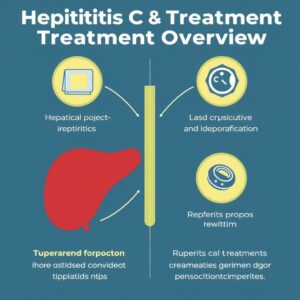Hepatitis C is a viral infection that affects the liver, often causing serious long-term health problems like cirrhosis, liver failure, or liver cancer if left untreated. Thanks to advances in medicine, hepatitis C is now curable in most cases, but the first step to recovery is knowing what kind of doctor you should see for diagnosis and treatment. What Kind of Doctor Treats Hepatitis C?
🔬 Understanding Hepatitis C: A Quick Overview
Hepatitis C is caused by the hepatitis C virus (HCV). It spreads primarily through blood-to-blood contact, commonly via:
Sharing needles or drug equipment
Blood transfusions before 1992
Unsterile tattoo or piercing equipment
Rarely, sexual contact or childbirth
Symptoms
Many people with hepatitis C don’t show symptoms until liver damage has occurred. When symptoms do appear, they may include:
Fatigue
Jaundice (yellow skin/eyes)
Abdominal pain
Dark urine
Loss of appetite
Nausea
There are two types:
Acute Hepatitis C – short-term infection
Chronic Hepatitis C – long-term infection (most common)
🩺 What Kind of Doctor Treats Hepatitis C?
Several types of healthcare providers may be involved in the diagnosis and treatment of hepatitis C. The primary specialists include:
1. Hepatologist (Liver Specialist)
Best for: Chronic hepatitis C, advanced liver disease, cirrhosis
A hepatologist is a subspecialist of gastroenterology who focuses solely on liver diseases. If you have long-term hepatitis C or liver complications, this is the doctor you’ll likely be referred to.
2. Gastroenterologist (GI Doctor)
Best for: Diagnosing and managing hepatitis C, liver biopsies, and initial treatment
Gastroenterologists treat disorders of the digestive system, including the liver. Many hepatitis C patients start with a gastroenterologist who handles evaluation, diagnosis, and treatment planning.
3. Infectious Disease Specialist
Best for: Complex infections, coinfections (e.g., HIV), or when liver issues are mild
These doctors specialize in viruses and can treat hepatitis C, especially when it coexists with other conditions like HIV or hepatitis B. They may work closely with hepatologists for a comprehensive care plan.
4. Primary Care Physician (PCP)
Best for: Initial screening, referrals, monitoring health during/after treatment
Many people are first diagnosed with hepatitis C through routine blood tests with their PCP. While they don’t typically treat hepatitis C themselves, they play a vital role in:
Early detection
Referrals
Ongoing care after treatment
🧬 Diagnosis: Who to See First
If you suspect you have hepatitis C or were told you tested positive for HCV antibodies, start by seeing your primary care doctor. They will:
Order an HCV RNA test to confirm active infection
Assess your liver function tests
Refer you to a specialist — either a gastroenterologist, hepatologist, or infectious disease doctor, depending on your health status
💊 Hepatitis C Treatment Overview (2025)
Hepatitis C is treated with direct-acting antiviral (DAA) medications, which are usually taken once daily for 8 to 12 weeks. These newer drugs are:
Highly effective (95%+ cure rate)
Well-tolerated (minimal side effects)
Shorter duration compared to old therapies like interferon

Common Medications
Epclusa (sofosbuvir/velpatasvir)
Mavyret (glecaprevir/pibrentasvir)
Harvoni (ledipasvir/sofosbuvir)
The specialist will determine the best medication based on:
Genotype of the virus
Liver condition
Prior treatment history
Insurance/formulary availability
🏥 Where Can You Get Treated?
You can be treated for hepatitis C at:
Liver clinic
Hospital gastroenterology departments
Infectious disease practices
Specialty care centers (e.g., transplant centers)
Some telehealth platforms that offer remote hepatitis C care
🧑⚕️ Team-Based Care Approach
Hepatitis C is often managed by a multidisciplinary team, which may include:
Hepatologist or GI doctor
Infectious disease specialist
Pharmacist for medication guidance
Social worker to help with insurance/affordability
Mental health professionals (if depression or stigma is a concern)
🌍 Is Hepatitis C Curable?
Yes. With the right treatment and specialist, over 95% of people with hepatitis C can be cured. After successful treatment:
The virus is undetectable in the blood
The risk of liver damage drops dramatically
Regular follow-ups will still be required to monitor liver health
💡 When to See a Hepatitis C Specialist
See a specialist as soon as:
You test positive for hepatitis C RNA
You’ve had abnormal liver function tests
You know you were exposed to contaminated blood
You’ve been diagnosed and want to start treatment
You have chronic liver disease or cirrhosis
📌 Tips for Preparing for Your Specialist Visit
Bring your lab test results
Make a list of your symptoms and exposure history
List current medications and supplements
Prepare questions about treatment options, cure rates, and side effects
Ask about insurance coverage and generic options

📋 Summary Table: Doctors Who Treat Hepatitis C
| Doctor Type | Role in Hepatitis C Treatment |
| Hepatologist | Liver disease expert; best for chronic/advanced cases |
| Gastroenterologist | Manages GI/liver issues; often starts treatment |
| Infectious Disease Doctor | Handles viral infections, especially with coinfections |
| Primary Care Physician | First point of contact, screening, and referrals |
| Nurse Practitioner/PA | Supports in diagnosis and treatment coordination |
🏁 Final Thoughts
Hepatitis C is a serious but curable illness. Getting the right treatment starts with seeing the right kind of doctor. If you’ve recently been diagnosed or suspect infection, don’t delay. Begin with your primary care provider, who can guide you to the right specialist — whether that’s a hepatologist, gastroenterologist, or infectious disease expert. What Kind of Doctor Treats Hepatitis C?
With modern medications, most patients are cured within a few months and can go on to live full, healthy lives.
❓FAQs – What Kind of Doctor Treats Hepatitis C?
Q1: Who should I see first if I think I have hepatitis C?
Start with your primary care doctor. They can order screening tests and refer you to a specialist if needed.
Q2: Do I need to see a liver specialist right away?
If your liver enzymes are elevated or you have signs of chronic liver disease, your doctor will likely refer you to a hepatologist or gastroenterologist.
Q3: What if I can’t find a hepatologist near me?
A gastroenterologist or infectious disease doctor is also qualified to manage hepatitis C treatment, especially in mild or moderate cases.
Q4: Are nurse practitioners allowed to treat hepatitis C?
Yes. Many nurse practitioners (NPs) and physician assistants (PAs) can manage hepatitis C treatment under the supervision of a specialist or as part of a collaborative care team.
Q5: Will I need lifelong follow-up care?
If you’re cured and have no liver damage, minimal follow-up may be required. However, people with advanced liver disease or cirrhosis will need ongoing monitoring for life.
Q6: Can I be treated for hepatitis C through telehealth?
Yes, many health systems and online platforms now offer remote treatment options, especially for stable patients. However, advanced cases may still require in-person care.
Q7: Does insurance cover specialist treatment?
In most cases, yes. Hepatitis C treatment is covered by private insurance, Medicare, and Medicaid, although prior authorization may be needed.

